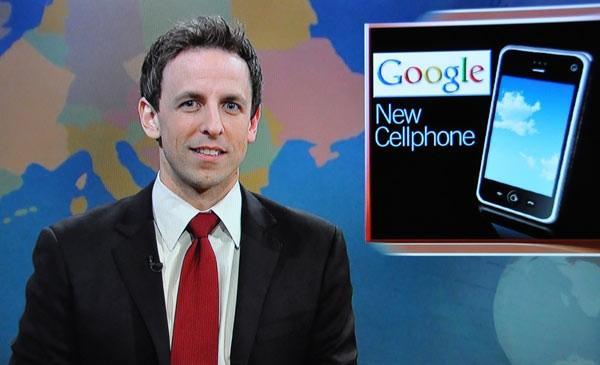
A week or so ago, the NY Times ran an article by Randall Stross about iPhone's problem with dropping calls, saying that the problem is in fact with the hardware, and not with AT&T's network. Despite the fact that John Gruber, amongst others, pointed out how full of holes the story was, the story ran in the Times and so many a consumer, businessperson, and non-techie friend of mine took it as truth (I got five, "Did you read that story?" calls from non-geeks the day it ran).
For the record, the story read as pretty irresponsible to me, given the sources the author used. I can't say with authority whose fault the dropped call problems are - Apple's or AT&T's - but as Gruber pointed out, Europeans use the same iPhones as Americans do and you don't hear lots of dropped call complaints form the other side of the pond.
Then this past weekend iPhone showed up as the butt of a Saturday Night Live joke. A "Weekend Update" story mentioned Verizon's Moto Droid as an iPhone challenger:
"It was reported this week that Google would soon launch its own cellphone as a challenge to the iPhone. Also a challenge to the iPhone? Making phone calls."
Ouch.
Now, for the record, SNL has been absolutely, disgracefully awful this season. This past weekend's show was perhaps the strongest all year thanks in large part to host James Franco, but totally fell apart after Weekend Update just the same. Seriously, SNL, hire some writers. You've got four or five funny cast members, but they're routinely given horrendously poor material to work with. Sorry, got off-topic there.
SNL has been particularly bad of late, but it's still a relevant cultural barometer, particularly when it comes to politics and news of the world. So like a lesser NY Times, when a story hits SNL people take it as truth (or, you know, satirized truth). Whether or not Apple's hardware is really at fault for all of those dropped calls, iPhone's got a big-time image problem on its hands.
The problem, ironically enough, is worse in areas like New York City and San Francisco, where media and techie types gather to work on, evangelize and complain about the bleeding edge of consumer tech. Both the New York Times and Saturday Night Live are produced in NYC, which is one of the hotspots of the iPhone/AT&T trouble. So while I can hear the cries of happy iPhone users in the midwest who've never, ever dropped a call, they're not the ones speaking to the national audience of decision makers.
Apple no doubt is deep in negotiations regarding the future of iPhone on AT&T and AT&T alone in the U.S. - if those negotiations aren't already completed, but hidden from public view for now. Whatever the plans for iPhone in 2010 and beyond, you know they'll be accompanied Apple's trademark clever & catchy marketing blitz.
Thing is, if AT&T/iPhone's dropped call issues persist, Apple marketing may not be enough. When your company's sole smartphone is tied to a single US carrier, perception is everything. Even if it is AT&T and not iPhone dropping the ball - er, calls - after awhile it won't matter. Dropped calls are dropped calls, and in due time all the apps in the world won't be able to cover for them any longer.